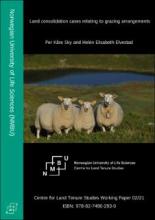Land Library
Welcome to the Land Portal Library. Explore our vast collection of open-access resources (over 74,000) including reports, journal articles, research papers, peer-reviewed publications, legal documents, videos and much more.
/ library resources
Showing items 1 through 9 of 62.Writers have guest-edited an African Studies Review forum on Understanding Land Deals in Limbo in Africa which examines the contentious politics of incomplete land grabs in Senegal;Tanzania and Zambia.
Presents a framework for tackling urban-rural land challenges. Designed to help a range of stakeholders in developing countries understand how to adopt an inclusive approach to land management and administration initiatives to produce a balance in urban and rural development.
Proponents of large-scale agriculture have put forward a multitude of reasons to support the advancement of this approach to farming. Large-scale agriculture is seen as the only way to “modernise” and “develop” the land;to close the yield gap;and to ensure food availability.
Law reform often involves political choices requiring public participation and consultation.
A report by Global Agriculture examines the agricultural impact of multinational land deals (aka ‘land grabbing’) which are found to be directly harmful to local food security and livelihoods.
In Uganda land remains the most sought–after natural resource;but legal and structural mechanisms have not been effective in addressing illegal land evictions faced by vulnerable communities.
Responding to an invitation from the Cameroonian government to help design a new land legal framework;civil society stakeholders have issued multiple proposals over the years on the topics they think should be included in the new land law.
Land consolidation courts deal with cases where the relationship between holders of grazing rights needs be regulated, but also where the rights holders are competing with other potential land uses, such as building holiday cabins, forestry, hunting, etc.
Describes how inclusive technology;a gender-responsive documentation process and shifting gender norms are empowering women through secure land rights. Includes recognising women as landowners;leading by example;securing land;securing futures.


